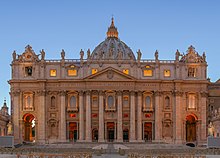
Back تجديد كاريزماتي كاثوليكي Arabic Renovación Carismática Católica Spanish Renouveau charismatique catholique French Katolikus karizmatikus megújulás Hungarian Renovation Charismatic Catholic Interlingua Pembaharuan Karismatik Katolik ID Rinnovamento carismatico cattolico Italian カトリック・カリスマ刷新 Japanese Renovatio Charismatica Catholica Latin Fihavaozana karismatika katôlika Malagasy
This article may rely excessively on sources too closely associated with the subject, potentially preventing the article from being verifiable and neutral. (March 2021) |
 Stained-glass window of a dove in Saint Peter's Basilica, symbolizing the Holy Spirit, who is believed by Christians to confer various gifts | |
| Formation | 1967 |
|---|---|
| Type | Catholic apostolic movement |
| Headquarters | Vatican |
| Website | www.charis.international www.iccrs.org |
| Part of a series on the |
| Catholic Church |
|---|
 |
| Overview |
|
|
| Part of a series on |
| Christianity |
|---|
 |
The Catholic Charismatic Renewal (CCR) is a movement within the Catholic Church that is part of the wider charismatic movement across historic Christian churches.[1][2]
The Renewal has been described as a "current of grace".[3] It began in 1967 when Catholics from Duquesne University attended a Protestant worship service and claimed to have been "baptized in the Holy Spirit". It is heavily influenced by American Protestantism, especially Evangelical Pentecostalism, with an emphasis on having a "personal relationship with Jesus", deep emotional experiences, and expressing the "gifts of the Holy Spirit".[4]
Cardinal Leo Jozef Suenens described charismatic renewal as: "not a specific Movement; the Renewal is not a Movement in the common sociological sense; it does not have founders, it is not homogeneous and it includes a great variety of realities; it is a current of grace, a renewing breath of the Spirit for all members of the Church, laity, religious, priests and bishops. It is a challenge for us all. One does not form part of the Renewal, rather, the Renewal becomes a part of us provided that we accept the grace it offers us”[5] According to Cardinal Raniero Cantalamessa, "He [Jesus Christ] is no longer just a set of theses and dogmas.... no longer just an object of worship and of remembrance but a living reality in the Spirit".[6]
Catholics who practice charismatic worship usually hold prayer meetings outside of Mass that feature prophecy, faith healing, and glossolalia. In Ann Arbor, Michigan, a Catholic church describes charismatic worship as "uplifted hands during songs and audible praying in tongues."[7][better source needed]
According to theologians Peter Hocken, Tony Richie and Christopher Stephenson, the Catholic charismatic renewal is intrinsically ecumenical and has given rise to covenant communities with members from major Christian denominations who lead a "shared life based on baptism in the Holy Spirit".[8]
Perceptions of the charismatic movement vary within the Catholic Church, although it has been favourably regarded by the last four Popes.[citation needed] Proponents hold the belief that certain charismata (a Greek word for "gifts") are still bestowed by the Holy Spirit today as they were in Early Christianity as described in the Bible. Critics accuse charismatic Catholics of misinterpreting, or in some cases violating, Church teachings on worship and liturgy. Traditional Catholics, in particular, argue that charismatic practices shift the focus of worship away from reverent communion with Christ in the Eucharist and towards individual emotions and non-liturgical experiences as a substitute. Other Catholics say that their involvement with charismatic renewal has revitalised their faith and led them to a deeper devotion to Christ in the Eucharist and a fuller appreciation of the liturgy.
- ^ Johnson, Todd M. (27 May 2020). "Pentecostal/Charismatic Christianity". Gordon–Conwell Theological Seminary. Retrieved 20 March 2021.
Charismatics usually describe themselves as having been 'renewed in the Spirit' and as experiencing the Spirit's supernatural and miraculous and energizing power. They remain within, and also form organized renewal groups within, their historical non-Pentecostal denominations (Catholic, Orthodox or Protestant), instead of leaving to join Pentecostal denominations. The largest Charismatic movement today is the Catholic Charismatic renewal, found in significant numbers mainly across Latin America.
- ^ Hocken, Peter (2009). The Challenges of the Pentecostal, Charismatic, and Messianic Jewish Movements: The Tensions of the Spirit. Ashgate Publishing. p. 58. ISBN 978-0-7546-6746-9.
The spread of the charismatic movement to the Roman Catholic Church demonstrates most clearly both the distinctive character of charismatic renewal within historic churches and its major potential significance.
- ^ "To participants in the 37th National Convocation of the Renewal in the Holy Spirit (1 June 2014) | Francis". w2.vatican.va. Retrieved 2019-12-21.
- ^ Csordas, Thomas J. (September 2007). "Global religion and the re-enchantment of the world: The case of the Catholic Charismatic Renewal". Anthropological Theory. 7 (3): 295–314. doi:10.1177/1463499607080192. S2CID 144747312.
- ^ Pope Francis quoting Cardinal Seunens (3 July 2015). "Address of His Holiness Pope Francis to the Renewal in the Holy Spirit Movement". The Vatican. Retrieved 21 December 2019.
- ^ "The Catholic Charismatic Renewal: A Current of Grace for the whole Church | CHARIS". Retrieved 2019-12-21.
- ^ Christ the King Catholic ChurchArchived 2006-05-07 at the Wayback Machine
- ^ Cite error: The named reference
HockenRichieStephenson2019was invoked but never defined (see the help page).
© MMXXIII Rich X Search. We shall prevail. All rights reserved. Rich X Search